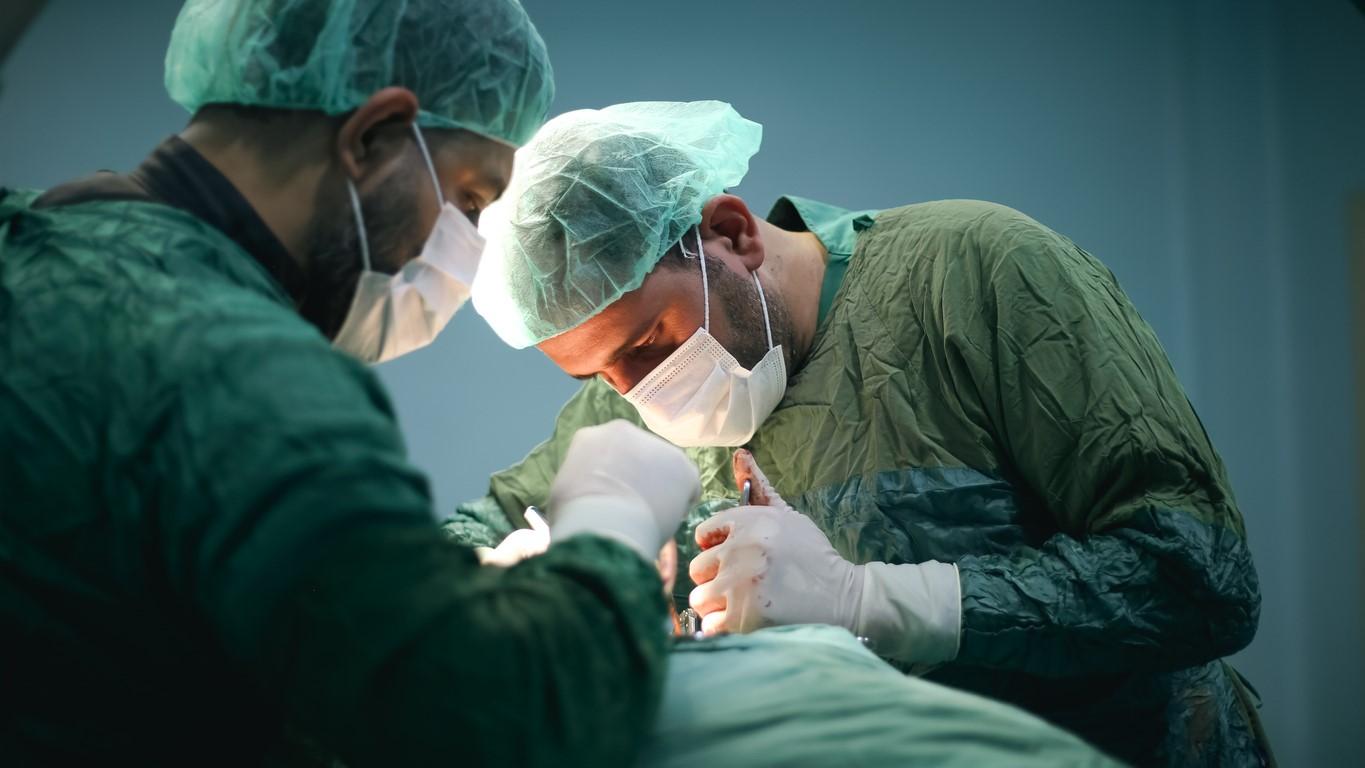
What happens if your appendix bursts?
Peer reviewed by Dr Krishna Vakharia, MRCGPLast updated by Amberley DavisLast updated 18 May 2023
Meets Patient’s editorial guidelines
- DownloadDownload
- Share
- Language
- Discussion
Your appendix is a small organ that sits in the lower right part of your tummy. It can become infected, swollen, and even burst. This is very painful, but it is survivable - knowing the signs and acting fast is important.
In this article:
Continue reading below
Can you survive a burst appendix?
Both adults and children can live without their appendix. In fact, around one in 100,000 people aren't born with one at all1. However, if you have a burst appendix - also called a ruptured appendix - this can be life threatening.
Your appendix can burst if you have appendicitis that's left untreated. This is a common condition where your appendix becomes blocked, swollen, and infected. If you have the symptoms of appendicitis you need to seek urgent medical attention - this could lead to a burst appendix as quickly as 48 to 72 hours after symptoms start2.
If this happens, bacteria and infection can spread throughout your body. This could infect your blood and cause a severe reaction called sepsis, damage other organs, and - in up to 5% of cases - become fatal3.
How to know if your appendix has burst
Back to contentsYou have a much better chance of recovering from a burst appendix if you get immediate medical attention and your appendix is removed as soon as possible. Ideally, you'll seek urgent medical attention at the first sign of appendicitis symptoms. In the UK, call 999 or be taken to A&E immediately.
Classic appendicitis symptoms include:
A dull pain around your belly button.
This pain travels to your lower right tummy and becomes suddenly much sharper.
Once your appendix bursts, your severe tummy pain and other symptoms may improve for a few hours. Don't assume you're recovering if you start to feel better without treatment - this can happen because a ruptured appendix initially relieves the build-up of pressure in the organ. After this time, symptoms return and develop.
Classic burst appendix symptoms include:
Severe pain in the lower right side of your tummy.
Feeling or being sick.
High temperature or chills.
Your symptoms may differ depending on the complications your ruptured appendix is causing:
Continue reading below
Complications of a burst appendix
Back to contentsPeritonitis
What: The bacteria leaks from your burst appendix into your stomach, causing the lining of your stomach wall to become inflamed and infected. This is called peritonitis.
Risk: If peritonitis isn't treated immediately, it can cause long-term health issues and may even be fatal.
Additional symptoms of peritonitis:
Severe and constant pain felt across your whole tummy.
A tense, hard tummy that can't be pushed in.
Extra pain while coughing or moving the legs at the hips.
Difficulty going to the toilet or passing wind.
Sepsis
What: The bacteria leaking from your appendix enters your bloodstream, causing severe infection and inflammation throughout your entire body.
Risk: If not treated early, up to five out of 10 people will die. Delayed treatment also risks serious health problems.
Additional symptoms of sepsis:
A fast heartbeat.
Confusion.
Abscess
What: a burst appendix infects your stomach and in response the tissue wall surrounds the appendix to block off the infection. This forms a collection of pus, known as an abscess.
Risk: treatable but painful, and in most cases the abscess needs to be drained.
Additional symptoms of an internal abscess:
Tummy pain may be in one area - but not necessarily the lower right side - or can be felt across your entire stomach.
The pain could be constant or sharp and stabbing.
Appendectomy - appendix removal
Back to contentsFor both appendicitis and a burst appendix, you'll need surgery to remove the appendix as soon as possible. This procedure is called an appendectomy.
There are two types of surgery to remove the appendix:
Open surgery - involves a cut being made in the lower right-hand side of your tummy to extract the appendix. You are likely to have this type of appendectomy for a burst appendix.
Laparoscopic surgery - also called keyhole surgery, this is done using smaller cuts and a long tube called a laparoscope.
Continue reading below
Appendectomy recovery FAQs
Back to contentsIs appendectomy high risk?
As with all surgeries, there's a slight risk of complications from the operation, including infection and bleeding. This risk is very small, compared to the risks of a ruptured appendix to your life and long-term health.
How long does it take to recover from having your appendix removed?
An appendectomy recovery will likely take longer if your appendix had ruptured. Your recovery time will also depend on other things:
Your general health
Whether you had developed complications because of the burst appendix.
Whether you have laparoscopic or open surgery.
How your body reacts to the surgery.
It's normal to feel weak and for your tummy to feel painful and swollen for several days after going home. In the first few days, you might also feel sick or experience digestive discomfort, such as gas, constipation, or diarrhoea.
Generally, it can take four to six weeks to fully recover from open surgery. While a laparoscopic appendectomy recovery takes as little as one to two weeks, this less invasive surgery is more often used for appendix that haven't burst.
How to care for yourself during appendectomy recovery
Eventually, your life will return to normal, and you won't need to make any long-term dietary or lifestyle changes. This said, you can make some adjustments to help your body heal after surgery.
Make sure you get enough sleep - your body heals while at rest.
Rest when you feel tired.
Attempt mild daily exercise, like walking every day - walking aids digestion and boosts blood flow.
For at least two weeks, avoid strenuous activities - for example, running, cycling, and heavy lifting.
Listen to your doctor for advice on when you can take showers, have baths, drive, and have sex.
Drinks lots of fluids - this also aids wound recovery.
If you experience digestive issues, try bland foods and avoid spicy, high-fat, and sugary options.
Always follow your doctor's advice on medicines. A burst appendix requires a course of antibiotics, so take these as directed. Your doctor will recommend if and when you can take or restart other medications. You may be prescribed pain medications or buy them over-the-counter and use as per packet instructions.
How to look after your surgical wound
Unless your doctor tells you not to:
24 to 48 hours after surgery, you may wash the surgery scar with warm water and gently pat dry.
Keep the area clean and dry - a gauze bandage can help prevent it rubbing against clothing.
If your incision has dressing in it, follow the after-care advice from your doctor. This could involve changing the dressing regularly. If this hurts, take your pain killers half an hour prior.
If the dressing sticks to your wound, soak with warm water for 10 minutes before attempting removal.
Further reading
Back to contentsPatient picks for Abdominal pain

Digestive health
What's causing your lower abdominal pain?
Pelvic (lower abdominal) pain is a dull, constant ache in bottom of your stomach. Lots of women get it and it can affect your quality of life. Here are some of the most common causes of pelvic pain in women.
by Lydia Smith

Digestive health
What causes nighttime stomach cramps?
Stomach pain - often described as a dull ache in your tummy - can have various causes. It usually doesn't last long, and is generally not serious. Stomach cramps, on the other hand, can differ from the fleeting nature of general stomach pain.
by Victoria Raw
Continue reading below
Article history
The information on this page is peer reviewed by qualified clinicians.
18 May 2023 | Latest version
18 May 2023 | Originally published

Ask, share, connect.
Browse discussions, ask questions, and share experiences across hundreds of health topics.

Feeling unwell?
Assess your symptoms online for free
Sign up to the Patient newsletter
Your weekly dose of clear, trustworthy health advice - written to help you feel informed, confident and in control.
By subscribing you accept our Privacy Policy. You can unsubscribe at any time. We never sell your data.